Holiday Meals for Military returns, filling gaps for struggling families
Operation Homefront has relaunched its annual Holiday Meals for Military initiative to provide complete holiday meals to service members and military families facing food insecurity, CBS News reports. The program matters because it addresses immediate hunger during a time of ritual and stress, while exposing broader cracks in benefits systems that leave some who served vulnerable.

Operation Homefront has relaunched its Holiday Meals for Military initiative this season, mobilizing volunteers and community partners to deliver or distribute holiday meals to active duty service members, National Guard and Reserve personnel, and veteran households with demonstrated financial need. The effort aims to ensure families who have served do not go without traditional holiday meals, a task that carries meaning beyond nutrition alone.
Holiday food assistance can blunt short term hunger, but its significance runs deeper. For many military households the holidays mark an acute increase in financial pressure as families cover travel, utilities and rent while also trying to preserve customary celebrations. Community based programs like Operation Homefront step in to meet urgent needs, yet their work also highlights persistent policy and equity gaps. Low pay for junior enlisted personnel, unpredictable civilian employment for spouses, and barriers to accessing safety net programs contribute to a reliance on charity for what many see as basic security.
Public health consequences of food insecurity are well established. Households that lack reliable access to adequate food face higher rates of chronic disease, mental health strain, and stress related disorders. For military connected populations these conditions can complicate reintegration, impede readiness for reservists and add strain to family dynamics that affects child development. Holiday meal drives temporarily reduce immediate nutritional shortfalls, but they do not substitute for sustained investments in economic stability and healthcare access.
Operation Homefront operates through local chapters and partner organizations to reach communities across the country, tailoring distribution to reach rural and urban areas where gaps in services often differ. Rural veterans frequently confront transportation and provider shortages, while families in high cost of living regions may be eligible for benefits but still fall short of covering basic expenses. The initiative is therefore both relief and a window into where additional policy work is needed.
The campaign also underscores barriers to long term assistance. Enrollment hurdles for SNAP and other benefits, stigma associated with seeking help, and limited awareness of veteran specific resources all reduce the effectiveness of government programs. Addressing food insecurity among military families will require policy adjustments that make benefits more accessible, targeted outreach that reduces stigma, and stronger ties between healthcare providers and social services so clinicians can identify and refer patients facing food hardship.
Community responses matter. Local food banks, faith groups, and businesses that donate time and resources amplify the reach of national nonprofits. Yet reliance on goodwill is inherently fragile when macroeconomic pressures fluctuate. For lasting improvement, advocates urge policymakers to examine pay and housing supports, simplify benefit access, and bolster programs that integrate nutrition assistance with medical and mental health care.
Holiday Meals for Military provides immediate comfort and essential nourishment to households who might otherwise go without during a season that emphasizes family and ritual. It is a reminder that public health, social policy, and community solidarity intersect at the dinner table, and that ensuring those who served are not left behind will require sustained policy attention as well as ongoing community commitment.


